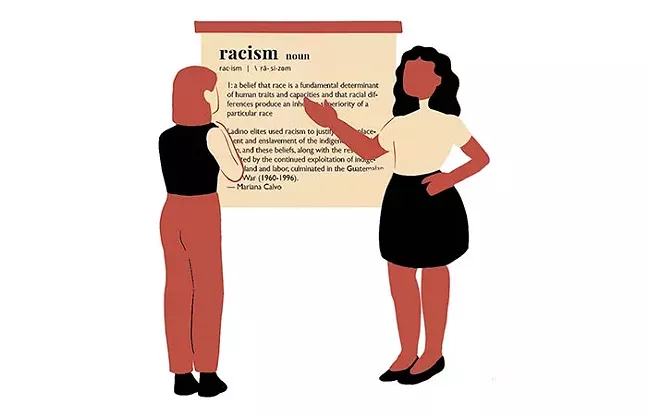Community, Leadership, Experimentation, Diversity, & Education
Pittsburgh Arts, Regional Theatre, New Work, Producing, Copyright, Labor Unions,
New Products, Coping Skills, J-O-Bs...
Theatre industry news, University & School of Drama Announcements, plus occasional course support for
Carnegie Mellon School of Drama Faculty, Staff, Students, and Alumni.
CMU School of Drama
Wednesday, September 22, 2021
The true meanings of racism and white supremacy
Opinion | Pittsburgh | Pittsburgh City Paper: Words matter. Language has the power to heal, hurt, celebrate, or condemn. We can speak the same language, use the same words, and still not mean the same thing. I do not mean toe-May-toe vs. toe-Ma-toe. Nor do I mean elevator vs. lift or apartment vs. flat.
So, what do I mean? I mean, to quote Inigo Montoya in The Princess Bride, “You keep using that word. I do not think it means what you think it means.”
Subscribe to:
Post Comments (Atom)

3 comments:
As we study this in Professor Parker’s Anti-Racist and Equitable Practices in Theatre course, I resonate with the author’s brutal approach to redefining “over-simplified” definitions for terms such as racism and white supremacy. Definition one could argue these have, in fact, been created by the same institutions who unintentionally promote racist ideology. After all, institutionalized racism essentially provides advantages and / or privileges to those of the dominant culture without directly hindering / hurting those of the global majority. In fact, the article can best be analyzed through the four tenants of oppression: internalized, ideological, interpersonal, and institutionalized, for, in my mind, these relate to white supremacy culture in the way it is pushed on society. “To grow up in America is to be trained in white supremacy,” writes the author, and that is definitely true. Becoming anti-racist, as we keep discussing in Professor Parker’s class, involves a process of unlearning and relearning.
I think the author of the article has made a really strong point here about white supremacy being something that is deeply rooted in American culture. And the fact that people are not aware of it is exactly why racism still exists till this day. Racism is not just about a harmful action against a BIPOC, but rather the whole systemic privilege and benefits that white people get in the society. Although most white people have never said a discriminating word to a non-white person, it doesn’t mean that they are not racist. In fact, because racism can be institutional and ideological (as Alexander pointed out above), no one is really free from it. So, we must actively seek actions that are anti-racist and not just non-racist. And as the article has said, this is a process of “unlearning”, where we reconsider the social construct that has been implemented long in our minds, and reevaluate the damage that follows.
The Princess Bride quote was A1 quality, but I do not mean to distract from the severity of this article. I find it harder to comment on articles like this but I will try my best. I think what stuck out to me the most was the part about unlearning. Not only unlearning the toxic cultural behavior that we were raised under but becoming aware of ways to actively engage in anti-racist behavior. I identify as a white female (I would say straight but curiosity never ceases) I grew up in Georgia until I was nine in a culturally diverse neighborhood (majority white, black, and Hispanic) and I moved to Northern Virginia which is also another diverse area (majority white, southern and eastern Asian population). Personally, I’ve struggled with figuring out where I stand within the discussions of racism and white supremacy. I try to view the world and treat everyone the same regardless of race/ethnicity, identity, culture, gender, age, and so on and know there is a lot of work to do in the world. I am trying and if anyone wants to have a conversation with me or feels they can give me some guidance I would love to grab some coffee sometime and chat
Post a Comment